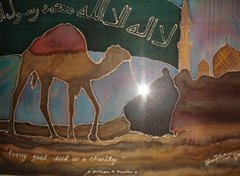
HADITH-11
On the authority of Abu Muhammad al-Hasan bin Ali bin Abi Taib, the grandson of the Messenger of Allah, sallallahu ëalayhi wasallam, and who is dearest to him, radiyallahu ëanhuma, who said: ìI committed to memory from the Messenger of Allah, sallallahu ëalayhi wasallam, (the following words):
ìLeave that about which you are in doubt for that about which you are in no doubt.î
[Al-Tirmidhi and al-Nasaíi related it, and al-Tirmidhi said: It is a good and genuine Hadith]
ìLeave that about which you are in doubt for that about which you are in no doubt.î
[Al-Tirmidhi and al-Nasaíi related it, and al-Tirmidhi said: It is a good and genuine Hadith]
Background :
This hadith goes in line with Hadith 6. In this hadith the Prophet, sallallahu ‘alayhi wasallam, has set a criterion by which Muslims can decide whether something is permissible or not. There is another version of this hadith where the Prophet, sallallahu ‘alayhi wasallam, elaborated further by saying: “Verily, truth is tranquillity and falsehood is doubt.” This means that the truth will lead to tranquillity and falsehood will lead to doubt.
Thus the criterion set by the Prophet, sallallahu ‘alayhi wasallam, allows us to judge what is false or wrong (i.e. something which causes us to be doubtful) and what is the truth (i.e. something which we are sure of and confident that it is correct because we feel happy and at peace with it). This hadith lays down a principle that can be applied in all aspects of one’s life. It also shows the way to truth and righteousness. Thus, this hadith is of extreme importance.
Lessons
This hadith indicates that one should only perform an act or deed (which is permissible and proper) if he is positive or certain of it. Performing this act will lead to some kind of tranquillity or happiness in this life and in the Hereafter – this is one of the benefits of applying the hadith.
In the other version of this hadith mentioned above, falsehood leads to doubt and never to tranquillity. So if a believer finds his heart being disturbed by something (i.e. he feels uncertain or doubtful), then he should stay away from it. The heart of the true believer is tranquil at the sight of truth and righteousness. And the heart becomes unsure and shaky at the sight of falsehood and wrong.
We can conclude that this criterion applies only to the guided righteous Muslim who is enlightened by wahi, i.e. the Qur’an and Sunnah, and is adhering to this guidance. If a Muslim is indulging in forbidden acts, this criterion will not work for him because his heart will not be sensitive to what it faces.
The criterion of the hadith is activated by certain conditions or pre-requisites: knowledge, iman, adhering to the enlightenment of the wahi, etc. In other words, this criterion can only exist if the person is adhering to the commands of Allah subhana wa ta’ala, the commands of the Prophet, sallallahu ‘alayhi wasallam, following the wahi, etc. Only then can a person reach such a status or level. But for those who indulge in muharramat (prohibitions), do not observe wajibat (obligations) , etc., this criterion will not be activated. Even if it does exist, it will not be reliable.
Sometimes there are people who try to avoid doubtful matters while they are indulging in muharram. For example, the people who killed al-Hussain (the brother of the narrator of this hadith). After having killed him, they start discussing about the ruling on the killing of mosquitoes, whether it is permissible or not.
There are many matters or issues relating to the shariah where the scholars have conflicting views or opinions. For example, some scholars say that it is a wajib to recite Surat al-Fatihah in the congregational prayer while other scholars say it is not. Or the paying of zakat for Muslim women’s jewellery – whether a woman has to pay zakat for jewellery that she wears/uses and not just for those that she keeps for investment – an issue which has never been resolved. In these situations, can the Muslim apply the criterion of this hadith? According to some scholars, it is permissible to do so – this is known as the ‘cautious approach’. This became a very well-known approach for some scholars who used it whenever there were conflicting views.
So for the issue of reciting Surat al-Fatihah, to those who insist that without reciting it the prayer is invalid, these scholars following the cautious approach say that they should recite it. And in the case of the zakat for jewellery, the cautious approach is that it is better to pay the zakat for all jewellery, whether it is worn/used or not, so that the woman will be ‘saved’ either way.
There is another approach of the scholars which holds that it is not a matter of conflicting views, it is a matter of the authenticity and soundness of the proofs. If there is a sound dalil (evidence), the scholars will follow it. This approach is also practiced by those who strictly follow a madhab because the madhab follows a dalil.
There are also many situations which consist of both good and bad. The cautious approach will suggest that we avoid an act if it involves both good and bad aspects. The approach which follows the dalil applies the concept of weighing between benefits and harms. This involves applying principles derived from the Qur’an and Hadith. These principles state that it is permissible to give up a minor benefit in order to avoid a major harm. Or tolerate a minor harm in order to avoid a major one or to gain a major benefit.
Looking back on Islamic history, we can see that some scholars were for one approach while other scholars were for the other. Thus it is not crucial for us to determine which one is the better approach.
In the situation of conflicting views where something is known for certain and something which is just a mere conjecture, what is known for sure will take precedence, i.e. will be the prevailing view. This is one of the principles of Fiqh. For example, if we know that a piece of clothing has some impurity on it but we are not sure exactly where, it is better that we wash the entire clothing. Another example is if a person is doubtful about how many rakaats he has already prayed, whether it is one or two, he should continue his prayer with what he is certain of - he is sure he has prayed one rakaat so he should continue with the second one.
Another principle is that it is not allowed to make ijtihad if something is clearly and definitively stated in the Qur'an or authentic Hadith. If there is text which clearly states the hukum (ruling), then the ijtihad is not needed.
There is no righteousness or piety in avoiding something that is clearly and unquestionably permissible, i.e. something that is lawful and clearly permitted by shariah. For example, in the area of food, one shouldn't say he will refrain from eating meat as a matter of righteousness. He will not be rewarded for this.
There is the hadith that tells the story of the three men, where one vowed not to sleep so he can pray all night, one vowed to fast everyday and one vowed not to marry, all for the sake of righteousness. These actions which these men vowed not to do (sleeping, eating and getting married) are lawful things which are not only permitted but also encouraged. (In fact, some scholars even say that there should be a minimum number of hours everyday which we allocate for sleep so that our bodies get enough rest.) When the Prophet, sallallahu ‘alayhi wasallam, heard of the three men's vows, he was very disappointed. He, sallallahu ‘alayhi wasallam, called them and told them he was the most righteous and pious amongst them and yet he sleeps, eats and marries. Moreover the Prophet, sallallahu ‘alayhi wasallam, made a principal concerning this matter by saying: “This is my way, and whoever refrains from it is not part of me.”
Thus, if something is clearly permissible in shariah, there is no point in refraining from doing it with the intention that doing so is an ibadah. If it is for other good reasons, e.g. to avoid meat because of one’s health, then it is okay.
One of the tricks of shaitan is that he will take something which is forbidden and present it in a way to make it look like a permissible act. One should be careful not to be deceived by shaitan. If something is muharram, then no matter what, it is forbidden. We must not allow shaitan to influence us and change our perception into thinking that something which is forbidden may not be all that bad after all – that it is permissible to do it.
Shaykh Jamaluddin Zarabozo says in his commentaries on Imam Nawawi’s Forty Hadith that in these contemporary times there are many matters in business transactions where there might contain some implicit aspects of riba’. Thus there are many new situations or issues where people are confused as to whether something is acceptable or not. He says that it is better to avoid acts which we are not sure of or where there are no clear views from scholars.
Sometimes these issues are discussed by scholars but their views are not being promoted enough to the Muslims in general. Many of the renowned scholars today meet once a year to discuss contemporary issues and these issues are then published in a special magazine. Unfortunately, this magazine is not widely distributed and not many people, including educators, other scholars, etc., are aware of it. We should all try to keep ourselves informed with the latest views or opinions of the scholars, especially on matters related to our lifestyle today, e.g. banking, insurance, etc.
Conclusion
This hadith equips Muslims with a practical criterion by which to judge doubtful acts and situations, and enables them to make the right decision concerning these matters. However, Muslims need to understand how to apply such a criterion correctly and not to be deceived by wrong perceptions or personal interest
Source (Jazak Allahu Khairan)









